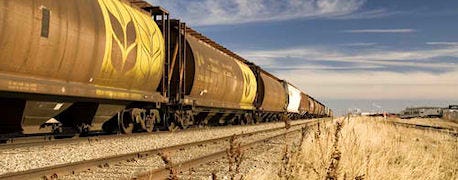
The railroad problems that disrupted grain shipments throughout much of the winter may spill in to spring and delay the delivery of fertilizer that farmers need to plant spring crops, grain industry officials testified this week.
During a hearing on Thursday, the Surface Transportation Board was told by grain officials and farmers that railroads need to restore service to levels a few years ago. One railroad, however, told the board it may take some time before they can add enough cars and crews to handle the increased demand from the coal, grain and oil industries.

Slow arrival of rail shipments could impede planting
"If the fertilizer doesn't get there than the crop doesn't get planted and there is not concrete evidence that the fertilizer will get there," said Terry Whiteside, chairman of Alliance for Rail Competition. The Alliance is a trade group representing a number of industries, including grain, that rely on railroads to ship goods.
Related: Rail Delays Hitting Home for Ethanol, Grain Shippers
The STB's hearing was assembled to review testimony on rail service disruptions from affected customers and discuss what is being done to improve service. Many of those from the grain industry who testified were from North Dakota, South Dakota and Minnesota. South Dakota's Secretary of Agriculture also testified.
Much of the grain industry's testimony relayed reports that lower prices were paid to farmers because crops were slow in moving to market. They alleged railroads gave priority to moving coal, oil and container shipments, while at times leaving loaded grain cars sitting on tracks.
In addition to worries that fertilizer may be slow to arrive, others said they have been told that because of the rail issues that they would receive only a portion of what they ordered.
"We cannot secure enough fertilizer to plant our crops this year," said Brian Schanilac of the North Central Bean Dealers Association.
Burlington Northern Sante Fe officials told the STB that the declines in service were due to the cold winter and to a surge in demand from the grain, oil and coal industries. The railroad is responding by investing in capacity and adding engines and crews, but said it will take time to restore service to where it was a few years ago.
Related: BNSF Grain Trains Are 23 Days Behind Schedule
"We are aware we have very large demand to move fertilizer on our railroad," said Stevan Bobb, BNSF's executive vice president and chief marketing officer. "We are taking points to ensure to capture every opportunity we can."
The Canadian Pacific Railway testified that many of the delays on its line were due to congestion in Chicago. It has tried to route trains around that area, but many still use that route, said Keith Creel, the railroad's president and chief operating officer.
For more on Fertilizer markets, check out Farm Futures Senior Grain Market Analyst Bryce Knorr's Weekly Fertilizer Review.
About the Author(s)
You May Also Like




